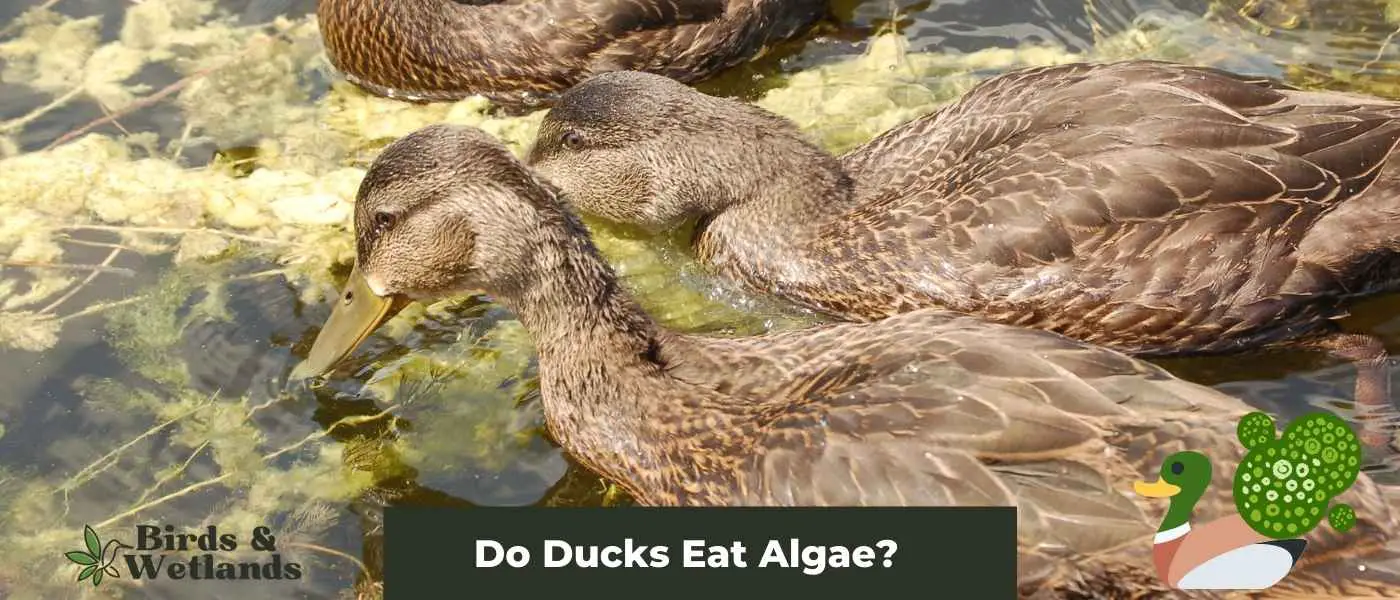Ducks are fascinating creatures with unique dietary needs. While many people may assume that ducks subsist on a diet of bread and crackers, the reality is much more complex. One food source that may surprise people is algae.
Algae is a common food source for wild ducks and can provide a range of essential nutrients for their diet.
Yes, ducks eat algae as it is a natural part of their diet. Algae serve as a food source for many aquatic animals, including ducks. They consume algae as they forage for other food items such as aquatic plants, seeds, insects, and small fish. Consuming algae can provide ducks with essential nutrients and contribute to their overall health and well-being.
Key Takeaways on Do Ducks Love to Eat Algae
- Algae is a natural food source for ducks and can provide them with essential nutrients such as protein, vitamins, and minerals.
- However, not all algae is safe for ducks to consume. Blue-green algae, in particular, can be toxic and potentially fatal to ducks.
- If you are considering feeding your ducks algae, it’s important to ensure that it is from a safe source and free from any toxins.
- Algae should also not be the sole component of a duck’s diet and should be fed in moderation alongside other nutritious foods.
- Overall, while ducks do enjoy eating algae, it’s important to prioritize their safety and health by only offering them safe and nutritious options.
Do Ducks Feed on Algae?
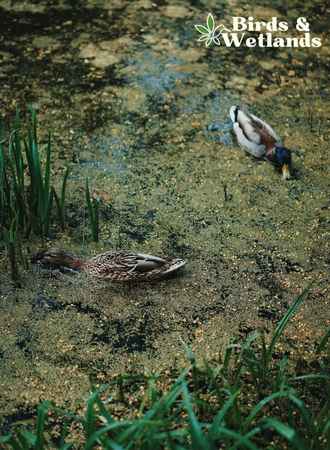
Ducks love to eat all kinds of food including leafy vegetables, cut grass, cracked corn, insects and small animals. But do they also eat algae?
Yes, ducks consume algae. Algae is a plant that thrives in freshwater settings and offers important nutrients to various aquatic organisms.
Ducks, in particular, rely on this nutrient-rich food source to power their daily activity and stay healthy. Because algae grow so quickly in an aquatic setting, there is always plenty for ducks to eat.
In addition to being high in nutrients, algae are soft and easy to digest, making them an ideal meal for these waterfowl.
At the same time, some caution must be exercised while feeding algae to ducks, as many forms are toxic and can cause serious harm if consumed.
Are Algae Good for Ducks?
For ducks, algae are a major source of nutrients, making them an essential part of their diet. Algae, which can range from simple single-celled creatures to more sophisticated freshwater plants, are high in protein, minerals, vitamins, and other essential micronutrients.
Ducks require these nutrients to support their quick metabolisms and to be healthy and active all year.
What Type of Algae Do Ducks Eat?
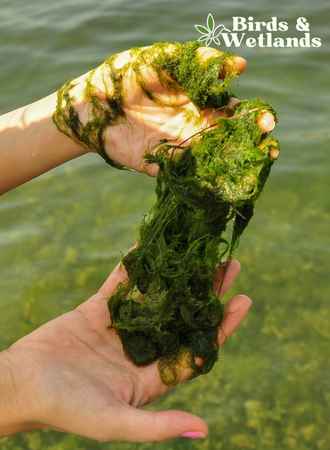
String algae or blanket weed are long, threadlike organisms that thrive in slow-moving or motionless waters. They are the kind of algae that grow on rocks. Many ducks feed on these forms of algae, using their mouth and tongue to comb through the water and grip onto tangled strings of algae.
Green algae, on the other hand, thrive in freshwater ponds and lakes and are smaller and rounder than string algae. Although green algae are not as tasty as string algae, it is an important food source for several aquatic birds.
Together, these two types of algae play an important part in the nutrition of many duck species, allowing them to stay healthy and energetic all year.
FAQs on Ducks’ Diet
Do Ducks Eat Fish in Ponds?
Generally speaking, domestic and wild ducks prey on aquatic invertebrates such as crayfish or insects rather than fish. While some duck species eat fish occasionally, most stick to their regular diet of underwater creatures rather than hunting for fish in particular.
On the other hand, some ducks such as Wood ducks will eat small fishes, such as minnows, if they are in the pond. Ducks are omnivores, which means they can eat animal and plant foods.
Typically, these waterfowl hunt fish by diving into the water, catching small prey with their beaks, and swallowing it whole. Many small fishes are easy prey for ducks because they spend most of their time at or near the water’s surface.
Do Ducks Eat Koi Fish?
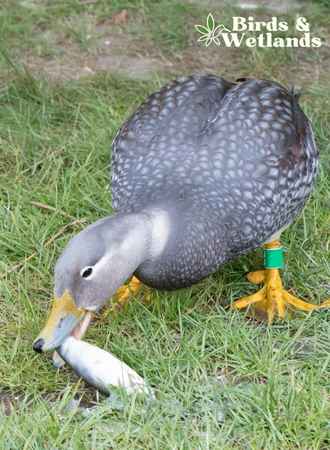
Ducks will frequently eat or kill small koi fish in a backyard pond. Ducks are opportunistic predators, meaning they will prey on any aquatic animal that is easy to catch and devour.
Ducks are particularly drawn to small fish due to their high-fat content and relative lack of defenses. As a result, koi less than a foot long are vulnerable to being eaten by ducks if they are not adequately protected by netting or other physical barriers.
On the other hand, larger koi can usually survive encounters with ducks because their bigger size makes them appear less appealing as potential prey.
Do Ducks Eat Goldfish?
Ducks will eat goldfish. These waterfowl are opportunistic predators that will eat anything that fits into their beaks, and goldfish are easy prey. Ducks can swallow a struggling goldfish whole, swallowing it down before the fish even has a chance to fight back.
As a result, if there are a lot of goldfish in a duck pond, the ducks will quickly gobble them up, wiping out the entire fish population.
If you plan on having goldfish in your pond, ducks can be dangerous to your goldfish so make sure to protect them and give them their own space away from your feathered friends.
Do Ducks Keep the Pond Clean?
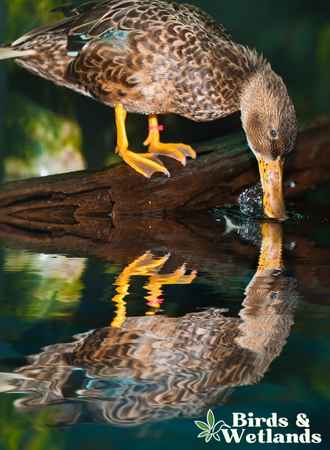
Ducks are thought to be natural cleaners. While it is true that ducks can help keep ponds clean, it is not as simple as tossing a few ducks into your pond and watching them go to town.
The specific needs of the pond in your yard determine whether or not ducks help with pond cleaning.
For example, if your pond has the worst kind of algae and slug problems, adding a few ducks to the mix may be just what you need to break up the excess growth and keep the water clear. Ducks will happily eat slugs, snails, algae, worms, tadpoles and small water lilies and pull weeds.
If algae become a huge problem, you can also use barley straw to limit algae growth and keep water clean. Never use chemicals to kill algae, especially if you have ducks.
Ducks have also been observed chasing and eating small snakes, which can effectively keep pests out of the pond water.
However, one disadvantage of using ducks for cleaning is that they tend to leave a lot of droppings and waste behind. This could result in higher levels of harmful bacteria in and around the pond, resulting in water quality issues.
While adding ducks can certainly be beneficial, it is critical to carefully consider your circumstances before deciding whether or not they are appropriate for your particular pond situation. If you have a large pond and only two ducks, your feathered friends might not be able to clean your pond quickly.
What Do Ducks Eat in the Pond?
Like geese and other waterfowl, ducks naturally love water. You can see them swim and dive underwater for food. They can frequently be found splashing around in the many ponds and lakes that dot their natural habitats.
Ducks, in particular, have a well-known and long-standing preference for eating aquatic plants and algae. Many duck species will dig up the muddy bottoms of their ponds to find tasty weeds and grasses.
Ducks will also consume aquatic invertebrates such as chironomid fly larvae, bugs, frogs and their eggs, which they can scoop up while swimming with their heads submerged.
Furthermore, some ducks will hunt for larger prey, such as small fish or insects that fall into the water.
Is It Good to Have Ducks in Your Pond?
Ducks are an excellent addition to a large pond because they benefit the environment and aquatic life. For starters, they serve as natural predators, assisting in controlling populations of harmful insect species such as mosquitoes.
Furthermore, your own ducks consume a large number of plants and algae in the water, which helps to maintain the balance and health of pond ecosystems.
Finally, ducks frequently leave nutrient-rich droppings that can aid in the fertilization of pond plants, resulting in improved water quality and increased biodiversity.
Other Food Ducks eat
Ducks can eat algae and it can be a natural part of their diet, especially if they live in a pond or other water sources where algae are present. Algae can provide some nutrients to the ducks, but it’s important to ensure they have a balanced diet with a variety of other food sources, such as insects, grains, fruits, and vegetables.
Best Duck Feed Pellets
Are you a duck owner looking for the perfect feed to keep your feathered friends happy and healthy? Look no further than Purina Duck Feed Pellets! With their nutritionally balanced formula and high-quality ingredients, these pellets are the ultimate solution for providing your ducks with the nutrition they need to thrive.
Pros
- Complete Nutrition: Purina Duck Feed Pellets are nutritionally balanced to provide all the essential vitamins and minerals that ducks need to stay healthy and strong.
- Easy to Digest: The pellets are specially formulated to be easy to digest, which makes them ideal for ducks of all ages.
- Promotes Growth and Development: With its balanced nutrition formula, Purina Duck Feed Pellets are designed to support healthy growth and development in ducks.
- Suitable for All Breeds: Whether you have domestic ducks or wild ducks, Purina Duck Feed Pellets are suitable for all breeds of ducks.
- Trusted Quality: Purina has been producing high-quality animal feed for over 100 years, so you can trust that your ducks are getting the best possible nutrition with Purina Duck Feed Pellets.
Cons
- Cost: Compared to other types of duck feed on the market, Purina Duck Feed Pellets can be slightly more expensive. However, many customers feel that the high-quality ingredients and balanced nutrition formula are worth the extra investment.
- Pellet Size: Some customers have noted that the pellet size of Purina Duck Feed Pellets can be quite large, which may not be suitable for smaller or younger ducks. However, many customers have reported that the pellets can easily be broken up or soaked in water to make them easier to eat.

